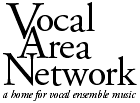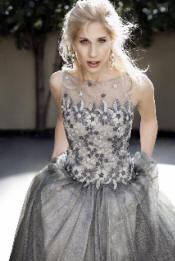 |
 |
Advertise | Sustaining Membership | VAN Store | Feedback
by Edward Sien for Vocal Area Network
Posted July 11, 2008
 Born in Jerusalem and educated at Juilliard, soprano Hila Plitmann has
quickly become a glittering jewel on the international music scene, known
worldwide for her astonishing musicianship and gossamer voice. In recent years
she has worked with many of today's leading conductors, including Leonard
Slatkin, Kurt Masur, Robert Spano, Marin Alsop, Esa Pekka Salonen, Andrew Litton
and Steven Sloan. In constant demand as a singer of new and contemporary
classical music, she has recently appeared as the soloist of several world
premieres, including Paul Revere's Ride by David del Tredici; Esa Pekko
Salonen's Wing on Wing; Mr. Tambourine Man by John Corigliano;
and Two Awakenings and a Lullaby, a song cycle written for her by Aaron
Jay Kernis.
Born in Jerusalem and educated at Juilliard, soprano Hila Plitmann has
quickly become a glittering jewel on the international music scene, known
worldwide for her astonishing musicianship and gossamer voice. In recent years
she has worked with many of today's leading conductors, including Leonard
Slatkin, Kurt Masur, Robert Spano, Marin Alsop, Esa Pekka Salonen, Andrew Litton
and Steven Sloan. In constant demand as a singer of new and contemporary
classical music, she has recently appeared as the soloist of several world
premieres, including Paul Revere's Ride by David del Tredici; Esa Pekko
Salonen's Wing on Wing; Mr. Tambourine Man by John Corigliano;
and Two Awakenings and a Lullaby, a song cycle written for her by Aaron
Jay Kernis.
Ms. Plitmann will join the Metropolis Ensemble for concerts on July 16 and 18, during which she will premiere Ricardo Romaneiro's Two-Part Belief. She graciously offered to take a few moments from her blisteringly busy schedule to answer some questions about her varied career and her special devotion to contemporary music.
Edward Sien: Your repertoire encompasses so many worlds -- Broadway, popular, opera. Tell us a little about your musical background.
Hila Plitman: I began playing classical piano at 6, and sang in choirs since I was about 9. I went to an arts-based high school (The Rueben Academy in Jerusalem) and then on to Juilliard for my Bachelor's and Master's degrees, but I always had a desire to communicate and be an actress on stage even more than I wanted to delve solely into the classical world.
ES: When did you surmise that you might be able to sing at a professional level?
HP: I can't say that it was much of a conscious and directed decision. Like many artists I know, I just feel compelled to do what I do and couldn't really see myself doing anything else -- to the great chagrin of my poor parents! So throughout my life I've just put my entire mind into my career and hoped that somehow the universe would follow. I still can't believe I'm actually doing this for a living.
ES: I am sure your parents are by now perfectly happy with your decision. You grew up in Israel. How does musical culture in Israel compare with that of the United States?
HP: Israel was a fantastic place for me to lay down my musical foundations. In many ways it possesses a musical culture similar to what exists in Europe -- it is “traditional” and maybe even conservative, but also more dedicated to the education of music and arts in general. There was an incredibly strong focus on theory and learning classical music in a well-rounded way. For instance, even though I'm a singer, I was very much exposed to the orchestral and chamber music repertoire.
However, there is a sense of experimentation and possibility -- similar to the American spirit in many other aspects -- that I feel exists here in the United States more than anywhere else in the world. There is a feeling that one can try and create a unique way of expressing oneself to the world, and that there is an audience out there that is willing to listen.
ES: Do you have any special attitudes or techniques that you use when you sing?
HP: While still in the study and practice stage of my process, I try to always learn the lyrics first (if there are any), so that I have a poetic understanding of what I'm about to sing. I then try to memorize the music, because I find that for me, personally, I'm a better performer and communicator if it's all internalized. I have all kinds of vocal techniques that I work on for hours on end, to try and really fit things to my body and voice. But, seriously, I will not bore you with those details!
Once on stage I truly try to be present, in the moment. Hopefully being prepared enough, I simply try to focus on being expressive, spontaneous and flexible -- to varying degrees of success, of course.
ES: How did you get involved with Ricardo Romaneiro and the Metropolis Ensemble? What are the special challenges of his music?
HP: I was supposed to do a concert with Metropolis Ensemble a while back which didn't pan out. The initial introduction was already made, and my manager at IMG, Mark Williams, was approached about this performance. He and Andrew Cyr (founder and Artistic Director of the Metropolis Ensemble) thought that Ricardo and I would be a great fit, since we both love doing these kind of "cross-over", fringe, un-traditional type of stuff.
I find Ricardo's music to be extraordinarily organic. It gives the performer a sense of freedom and openness while at the same time consisting of very well thought-out structure and immense drive. I think a certain challenge for me is finding the balance between all those elements.
ES: You certainly seem to have a great affinity for contemporary classical music. You have worked extensively with composer John Corigliano, who, incidentally, calls you "the best in the world" at what you do. Tell me more about your upcoming recording project.
HP: John is FAR too kind. I think he may even need his hearing checked! I got extremely lucky to have this particular song cycle of John's pass my way. The cycle is called Mr. Tambourine Man and is comprised of seven songs, all with lyrics from Bob Dylan songs, but set to Corigliano's extraordinary music. He was commissioned to write it originally for voice and piano for the brilliant singer Sylvia McNair, which she sang during a concert in Carnegie Hall. He then created an orchestral version, which I premiered a few years back. The upcoming recording project you mention is this same orchestral version performed with the Buffalo Symphony, JoAnn Faletta conducting. It will be released soon on the Naxos recording label.
I cannot speak highly enough of these pieces. I feel that John truly elevated the meaning of Dylan's exquisite poetry. Both the way each song is written and the order in which he organized them puts them at such a level of dramatic intensity that, I believe, the listener has a feeling of having gone through an incredible emotional journey.
This is part of why I have such an affinity to (good) contemporary music. I feel that there are some exceptional composers out there that are creating superb works of art, which that can affect audiences in deep, substantial and valuable ways. And I feel like whatever we might be calling "classical music" these days needs more of these kinds of moving experiences.
ES: The Metropolis Ensemble is expressly trying to create new audiences for contemporary music. From where you stand (and sing), how does the future of classical music look to you?
HP: I believe that the path the Metropolis Ensemble is treading is essential and inspirational for the perseverance and continued growth of live contemporary music and performance.
I feel (as I think many others do nowadays) that the line between "classical" and "popular" music is, and should be, less and less defined in those obsolete "quality" terms in which the classical world used to define them (i.e - classical music is "intelligent", "complex", "meaningful", "esoteric", while popular music is "base", "simple", "uninteresting", "pedestrian"). I believe that someone like Björk, for instance, who is one of my most favorite artists on this earth, is writing more beautiful, interesting, complex "art songs" in her so called "pop" medium than many of the classical composers out there. I personally believe that the more we embrace the world around us and learn to incorporate all its subtleties and variations, the more we can create things of meaning and beauty, and the more chance we have to survive and grow in this ever-changing and fascinating climate.
ES: And if you weren't a singer…?
HP: I'd be an astronaut!
--------------------------------------------------------------------------------------------------
The Metropolis Ensemble was founded by Artistic Director/Conductor Andrew Cyr with the mission of presenting music as a living art form: one that is continuously renewed via dialogue between past and present composers, and today's performers and listeners. To that end, programs provide vital support to living composers by encouraging and commissioning the creation and performance of new works; by presenting musical masterpieces from the past along with the present; and by taking this mission into New York City's schools to educate the next generation of composers, musicians and listeners.
July 16, 8 to 10 PM: The Revolution @ Le Poisson Rouge, 158 Bleecker Street.
Tickets: 800-838-3006.
World premiere of The Rite: Remixed. Also on the program, Ricardo Romaneiro's
Synthetic Mosaic: II featuring pianist Ola Gjeilo, and Two-Part Belief (world
premiere, poetry by Christopher Cahill), featuring soprano Hila Plitmann.
July 17, 9 PM to 2 AM: LIVE @ LPR (Le Poisson Rouge, 158 Bleecker Street.
Tickets: 800-838-3006.
Featuring The Rite: Remixed and Ricardo Romaneiro's Digital Cities, in a
hyper-kinetic show of future-forward electro-classical beats also featuring
minimal tech house by guest DJs.
July 18, 7:30 to 11 PM: Celebrate Brooklyn @ Prospect Park (enter at 9th Street).
Free.
Wordless Music Series pairs Metropolis Ensemble and indie sensation Deerhoof
for a night of music under the stars. Metropolis Ensemble's The Rite: Remixed
and Romaneiro's Two-Part Belief featuring soprano Hila Plitmann.
Edward Sien writes frequently about music.